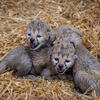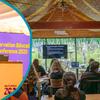Two critically endangered blue crowned laughingthrush chicks (Pterorhinus courtoisi) have been saved by their dedicated keepers at ZSL Whipsnade Zoo, who fed them 12 times a day after their parents were unable to care for them.
Bird keepers at the conservation zoo stepped in and hand-reared the rare birds, after the laughingthrush chicks’ parents stopped looking after their eggs.
Taking shifts to maintain the intense care schedule, keepers simulated natural parenting patterns, turning the eggs five times a day while they were in the incubator, creating a nest for the newly hatched chicks to grow in and feeding them 12 times a day, until the birds were able to feed themselves.
Endemic to the forests and shrubland of China’s Jiangxi Province, there are now thought to be less than 250 adult blue crowned laughingthrushes left in the wild, due to habitat loss and wildlife trade. The chicks are part of a Global Species Management Plan for the rare species, classified as Critically Endangered by the IUCN Red List of Endangered Species.
Early video, recorded by keepers when the chicks were just days old, shows the tiny, ‘alien-like,’ featherless laughingthrushes lifting their open beaks for finely chopped pieces of food, fed to them with special, feeding tweezers. Recent video shows the chicks at four weeks old, flying around the ‘fledgling aviary’ with their full plumage.
Deputy bird team leader, Claire McSweeney said: “We are so delighted that these two, globally significant chicks, who we have been caring for since before they even hatched, are doing so well.
“Hand-rearing chicks like these requires utter dedication and round-the-clock efforts from the whole team. We have to get everything right. When building the nest, for example, we have to make sure it’s cosy enough for them to huddle up together but has enough space for them to move apart a little if they get too hot. We made their nest with coconut fibres and astroturf, and included twigs small enough for them to get their tiny feet around, as it is vital that they develop the muscles to grip things.
“We hand-fed the chicks a pureed mixture at first, but gradually weaned them onto a mixture of fruit and insects. Once they were strong enough, we started leaving food out for them so they could try eating independently.
“After about two weeks, once their eyes were fully open and their tail and wing feathers had come through, they began to sit on the edge of the nest, trying to flap. In the fourth week, all their remaining body plumage grew in, and we knew it was time for them to be released into the fledgling aviary, where they could start to explore their environment and practice flying from branch to branch.”
When the birds are old enough, they will join their parents in the Zoo’s blue crowned laughingthrush habitat. A social species, laughingthrushes usually stay with their flock throughout winter before finding mates in the summer months.
Summer visitors to ZSL Whipsnade Zoo can see many species of birds, including its colonies of northern rockhopper and black-footed penguins, as well the birds of prey and colourful macaws that swoop over visitors during its spectacular Birds of the World demonstration. Ten thousand animals, from elephants and rhinos to lions and tigers, roam across the 600-acre site, set amidst the beautiful Chiltern hills. For more information or to book, see zsl.org
Related Members
-
News
 Rare North African cheetah cubs born 4th March, 2026The award-winning Yorkshire Wildlife Park is celebrating conservation breeding success with the birth of four cheetah cubs as part of the Endangered Species…
Rare North African cheetah cubs born 4th March, 2026The award-winning Yorkshire Wildlife Park is celebrating conservation breeding success with the birth of four cheetah cubs as part of the Endangered Species… -
News
 Blog: Why Hosting a BIAZA Conference Matters 3rd March, 2026For this week's blog, Chris Eley (Hertfordshire Zoo) recounts the value of hosting a BIAZA event in 2025: In November 2025, we hosted the BIAZA…
Blog: Why Hosting a BIAZA Conference Matters 3rd March, 2026For this week's blog, Chris Eley (Hertfordshire Zoo) recounts the value of hosting a BIAZA event in 2025: In November 2025, we hosted the BIAZA… -
News
.png?w=100&h=100&zc=1&f=jpeg&hash=97e6d151315c515d23f80e6ee9d1d533) BIAZA Blog: How Accreditation is creating change at BIAZA 25th February, 2026After two years of BIAZA Accreditation, the team delivers a look ahead on the programme to support and boost world-class zoos…
BIAZA Blog: How Accreditation is creating change at BIAZA 25th February, 2026After two years of BIAZA Accreditation, the team delivers a look ahead on the programme to support and boost world-class zoos…


